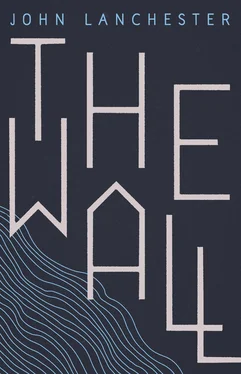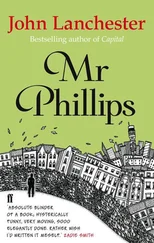When I woke it was just starting to be light and Hifa was still sleeping. I had realised, during the hours of darkness, that there would be one moment to hope for, one moment of possible salvation, and it would come when the sun rose and we could look for the island. There was no way of knowing how far and fast we were drifting. We might be hardly moving. We might be moving at a walking pace, say three miles an hour, so that by daylight we could be more than twenty miles away. I just couldn’t tell. If we could see the island, we could row towards it and find what was left of the community. I didn’t think that everyone could have survived, but half of them might still be alive, and half of the rafts still workable, and with that we could try to start again. On this lifeboat we had some food and water, but the community, what was left of it, had none. Unless we weren’t the only ones with a secret cache that the pirates hadn’t found. But where we had once built up reserves of food and water, with luck we could do it again. Maybe. We’d just have to get through the first few days with the supplies we had on the lifeboat and hope we were lucky with fresh rainwater.
A sign that day had fully broken was when a bar of light came over the side of the lifeboat and illuminated the edge of the awning. I lay where I was for a few minutes, putting off the moment when I would, one way or another, know.
Hifa turned over in semi-sleep. That meant she would be waking up soon. For reasons I can’t explain, I wanted to face the facts of our situation for a little while on my own: I wanted to know first. I carefully got up and crawled out from beneath the awning. The day was calm and clear. I took a long slow scan of the horizon, then another, then a third one to be sure. There was a patch of cloud on one point of the horizon that could, just possibly, have been a bank of weather gathering over the island where we had sheltered. I stood and watched it for a few minutes, then looked away, and looked back, and there was no mistaking that the clouds were changing shape and dissipating. They had not gathered over the island. There was nothing else to be seen, at any point of the compass. We had drifted away from the island and the community and were now on the open sea.
A few minutes later, Hifa joined me. By that point we had spent so much time together on the Wall and on the water that the first seven-eighths of any conversation were had in silence. She did the same tour of the horizon I had done, then looked at me. I nodded to say, yes, you’re right, I’ve looked too and there’s nothing there.
‘I’ll set up the water catchments and the lines, you do the inventory. Or the other way around,’ said Hifa. I could see in her face the same thoughts I’d been having, not of fear – there would be time for that later – but sadness and loss. The people who weren’t with us any more were still there in her eyes. No doubt she could see the same thing in me.
‘Inventory,’ I said.
So that’s what I did. The secret compartment was under a false panel at the back of the boat. Even though I knew it was there, it still took me a moment to find, and I had a wild second of panic when I thought I’d been imagining the hidden cache – but no, it was just a very clever design, a fake plank fitting seamlessly with the real planks around it. Thank God, because otherwise the pirates would have found it, and we would have been as good as dead already. I opened the compartment and started sorting through what we had. The news was good. My rough calculation was four weeks’ food, more if we were very careful and didn’t do too much manual work. There was only about a week’s water, but my hunch was that with only two of us, given how much rain there was, we could probably make it to four weeks with water too. Lack of food kills you in three weeks, lack of water in three days. We would be OK for a little while.
No sooner had Hifa finished putting out the lines than she was pulling two of them in again, mackerel wriggling on the end. I tried to take that as a good omen. She killed them and put the lines back out again. Then she wiped her hands on herself and came and sat next to me where I was putting the food stores back in the hidden compartment.
‘Plan?’ she said.
I shook my head. I said: ‘We’re drifting south-west, I think. Away from the Wall. But I’m guessing. I don’t really know where we are.’
‘The Captain’s plan was to head south. He said there were places where people would help us.’
‘He said he knew places – we don’t. Big difference.’
Hifa shrugged. I shrugged too. I can’t remember who spoke first and who agreed, but what we settled on was, south. Towards the places where the Others came from. It made sense: we were Others now.
For the next week we did a mixture of drifting and gentle rowing to correct our course. We had no compass so the navigation wasn’t rough and ready so much as rough and rougher. There were sharp ups and downs to our emotions, not just hour by hour but minute by minute. There were times when I could imagine finding settleable land, finding food, finding somewhere we could live peaceably for the rest of our lives, be happy, even live a kind of idyll, and other times when I came close to thinking the best thing would be just to get over the side of the lifeboat and swim away from it until my strength gave out and the end came. Hifa at times was affectionate, at times irritable, at times silent, and there were even times when we joked and laughed as much as when we were back in our private room in barracks on the Wall. We cuddled to keep warm and even had sex once or twice. Death and sex – close companions. We didn’t talk much about what had happened, and when we did, we were quick to absolve ourselves. There wasn’t much that we could have done that was any different, or would have made any difference. There were a lot of ways we could have got ourselves killed too.
We caught a few fish. We collected some rainwater. I think those supplies extended our probable survival time by about a week to ten days. I told Hifa I was trying not to think about it, but in truth I was running calculations all the time: how long we had left, how far we could drift or row, what were our odds. I thought we would be unlucky to head roughly south for a month and not come across land at any point, but I also had no illusions about just how unlucky it was possible to be. As Sarge would have pointed out, if we weren’t freakishly unlucky, we wouldn’t be here in the first place.
On the afternoon of the eighth day, I saw something on the horizon. I went through that usual sea-sequence of thinking something is a cloud, then suspecting/hoping it might not be, then the hope growing, then ecstatically letting yourself accept that hope is justified. The thing I could see was too square, too abrupt in its angles, to be a natural object. We were past caution, so we adjusted our direction and started rowing towards it, hard shifts of thirty minutes each. We were desperate to get there while it was light, because we knew that once darkness had fallen we might never find it again, whatever it was. We could drift away from it in the night as we had drifted away from the island. So it was now or never. My hands had grown unused to rowing when we were on the rafts, but the diving had helped me to get reasonably fit, and having a destination in sight made it easier too. We rowed for about three hours. As we came closer it became apparent that it was an oil or gas installation. From a distance there was no way of telling if it was inhabited or not. At closer and closer range, that was still true. There was nobody to be seen on deck and no sign of activity.
‘What if we can’t get up it?’ Hifa asked, while I was rowing. She was standing at the front of the boat, not looking at me but at the platform. She had read my mind, because once I realised what the platform was, I had begun to worry that there would be no means of getting off the lifeboat and onto the structure; that we would bump up against it as we almost had against the island, and find no way of climbing aboard. The disappointment of that could kill me.
Читать дальше












